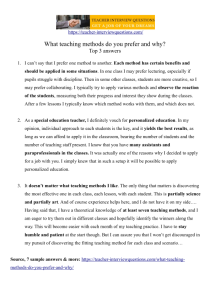Teaching is not an easy profession. Students expect a lot, administrators too, and what works for you perfectly in one classroom may fail in another one–without an obvious reason. Knowledge of different teaching methods and classroom management strategies will help you stay more flexible during your teaching practice, and allow you to achieve better results.
Hence it is always good to mention at least a few teaching methods, and ensure the interviewers that you do not stick stubbornly with one method only, just because it is the most convenient one, or one that yielded best results for you, up to this point of your career.
The key is to demonstrate your knowledge of teaching methods, and emphasize that you’d adjust your selection to the actual situation in a classroom, the topic of the lesson, and the general guidance at school.
Let’s have a look at 7 sample answers to the question, and then we will analyze the question some more.
7 sample answers to “What teaching methods do you prefer and why?” interview question
- I believe that demonstrating and collaboration are the most effective teaching methods at the secondary school. The side benefit is the development of communication skills and teamwork. However, I have experience with all main teaching methods, including explanation, demonstration, learning by teaching, as well as some unorthodox methods, for example learning by playing. When I prepare my lesson plans, I always think carefully about each lesson and what would be the best and most engaging teaching methods to apply in it. I always try to mix it up, so the students experience the unknown, and the lessons are not routine, or boring.
- I can’t say that I prefer one method to another. Each method has certain benefits and should be applied in some situations. In one class I may prefer lecturing, especially if pupils struggle with discipline. Then in some other classes, students are more creative, so I may prefer collaborating. I typically try to apply various methods and observe the reaction of the students, measuring both their progress and interest they show during the classes. After a few lessons I typically know which method works with them, and which does not.
- To be honest, I still consider myself inexperienced to tell. In theory I’ve studied all methods–project based learning, flipped classroom, Montessori, and of course also the more conventional approaches to leading the lessons. But I haven’t had yet a chance to try them out in a real classroom environment. Anyway, students’ engagement is extremely important for me, and you can be sure that I won’t stick with one method only. Veteran teachers working here will hopefully also give me some advice, based on their experience with local students.
- As a special education teacher, I definitely vouch for personalized education. In my opinion, individual approach to each students is the key, and it yields the best results, as long as we can afford to apply it in the classroom, bearing the number of students and the number of teaching staff present. I know that you have many assistants and paraprofessionals in the classes. It was actually one of the reasons why I decided to apply for a job with you. I simply knew that in such a setup it will be possible to apply personalized education.
- Working at this level, with students this smart, I think that we have to apply constructive approach to teaching. Let the students talk, engage them in everything. In an ideal case scenario, I would speak just ten percent of the time and the rest of the time students will talk. Of course, one has to prepare for this in advance and know what they are doing. But I can assure you that I take my preparation for the classes extremely seriously, and have confidence that I will be able to apply the student-centered approach in my classes.
- Bearing in mind that I will talk here in front of hundred and fifty students at a time, it is hard to imagine doing anything else than lecturing. Of course, it is important to add some questions to my talk, to engage the students, to make sure they think while seated in the auditorium, instead of just penning down my exact words. But with the allotted time, the number of students, and the amount of topics we have to cover during the semester, I cannot afford to apply more creative teaching methods during the lessons. At least that’s how I see it, based on my previous experience.
- It doesn’t matter what teaching methods I like. The only thing that matters is discovering the most effective one in each class, each lesson, with each student. This is partially science and partially art. And of course experience helps here, and I do not have it on my side…. Having said that, I have a theoretical knowledge of at least seven teaching methods, and I am eager to try them out in different classes and hopefully identify the winners along the way. This will become easier with each month of my teaching practice. I have to stay humble and patient at the start though. But I can assure you that I won’t get discouraged in my pursuit of discovering the fitting teaching method for each class and scenario…
* Special Tip: Download the TOP answers to this tricky questions in a one page long PDF, print it, and practice your interview answers anytime later:

Learn some terminology before heading to your interview
In the reality of the classroom, names and monikers do not matter. Students do not need to know whether you are applying inquiry-based learning or a flipped classroom. What matters is that they enjoy the lesson, are engaged, and eventually learn what they are supposed to learn (at least each to their level of ability).
In an interview, however, it helps if you throw in some names and technicalities from time to time. If you do remember these things from college, head to Google and type in “teaching methods”, and go through two or three first results. Just to get a better grasp of the subject, pick your favorites, and make sure that you won’t remain silent if they inquire about a particular teaching method.
Keep in mind though there this isn’t a scientific subject, and you will find various classifications of teaching methods, as well as different names for almost each method. It should not bother you much though. As long as you understand what the methods are about, you will be fine giving them any meaningful name in your interviews…

Make engagement and results your first priority
Engagement and results go hand in hand. Students who aren’t engaged in your teaching will struggle with motivation, which will necessary reflect on their results and grades. Interview question about teaching methods is your opportunity to stress the importance of engagement.
Ensure the interviewers that you will carefully keep your eye on what’s going on in the class, whether the students actually pay attention, whether they are involved, and how application of different methods reflects on discipline, engagement, and eventual results of your pupils. That’s the yardstick to measure the success of different methods, as well as your success as a teacher…
Next Questions:
- Why should we hire you, and not one of the other applicants?
- How do you include parents and guardians in their child’s education?
- Why do you want to teach here?
